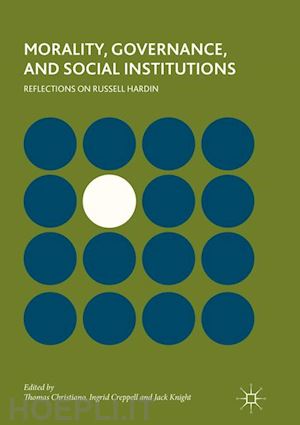
Questo prodotto usufruisce delle SPEDIZIONI GRATIS
selezionando l'opzione Corriere Veloce in fase di ordine.
Pagabile anche con Carta della cultura giovani e del merito, 18App Bonus Cultura e Carta del Docente
This book reflects on the research and career of political theorist Russell Hardin from scholars of Political Science, Philosophy, Sociology, Economics, and Law, among other disciplines. Contributions address core issues of political theory as perceived by Hardin, starting with his insistence that many of the basic institutions of modern society and their formative historical beginnings can be understood as proceeding primarily from the self-interested motives of the participants. Many of the contributions in this volume struggle with the constraints imposed on political theorizing by the idea of self-interested agents, or homo economicus. Some reject the idea as empirically unfounded. Others try to show that homo economicus is even more versatile than Hardin depicts. And yet others accept the constraints and work within them. But all pay tribute to the lasting intellectual contribution of Russell Hardin and the challenge he poses. The book should appeal to scholars and students interested in collective action, public choice and democracy, moral reasoning and its limits, constitutionalism, liberalism, conventions and coordination, trust, identity politics, social epistemology, and methods in politics philosophy.
1. Introduction.- 2. The Political Psychology of Constitution-Making.- 3. Russell Hardin's Hobbes.- 4. "FüHrer Befiehl, Wir Folgen Dir!": Opinion Dynamics in Extremist Groups.- 5. Trendsetters and Norm Change.- 6. Self-ESTEEM.- 7. Violence and Politics in Northern Ireland: IRA/Sinn Fein's Strategy and the 2005 Disarmament.- 8. The Priority of Social Morality.- 9. The Liberty of the Ancient from a Humean Perspective.- 10. A Political Theory of Constitutional Democracy: On Legitimacy of Constitutional Courts in Stable Liberal Democracies.- 11. Assesing Constitutional Efficacy: Motivated by Constitutional Law or by Social Norms? How Can We Know?.- 12. Constitutions as Conventions: A History of Non-Reception.- 13. On the Twentieth Anniversary of One for All: The Logic of Group Conflict in Northern Ireland and Beyond.
Thomas Christiano is Professor of Philosophy at the University of Arizona, USA.
Ingrid Creppell is Associate Professor of Political Science and International Affairs at George Washington University, USA.
Jack Knight is Frederic Cleaveland Professor of Law and Political Science at Duke University, USA.











Il sito utilizza cookie ed altri strumenti di tracciamento che raccolgono informazioni dal dispositivo dell’utente. Oltre ai cookie tecnici ed analitici aggregati, strettamente necessari per il funzionamento di questo sito web, previo consenso dell’utente possono essere installati cookie di profilazione e marketing e cookie dei social media. Cliccando su “Accetto tutti i cookie” saranno attivate tutte le categorie di cookie. Per accettare solo deterninate categorie di cookie, cliccare invece su “Impostazioni cookie”. Chiudendo il banner o continuando a navigare saranno installati solo cookie tecnici. Per maggiori dettagli, consultare la Cookie Policy.